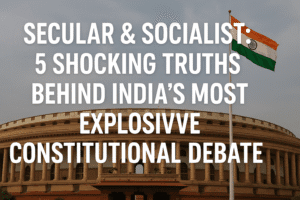Secular & Socialist: 5 Shocking Truths Behind India’s Most Explosive Constitutional Debate
Telangana BJP President N. Ramchander Rao sparked controversy by labeling the Congress party the “All India Cheating Congress,” accusing it of misleading the public about BJP intentions to alter the Constitution. Rao argued that the words ‘secular’ and ‘socialist’ in the Constitution’s preamble lack original legitimacy, having been added during the 1976 Emergency period – an era he condemned as a “black day” for democracy. He emphasized that subsequent non-Congress governments, including the BJP’s multiple terms, never attempted to remove these terms despite opportunities.
This criticism aligns with recent RSS remarks questioning the amendment’s validity. Congress President Mallikarjun Kharge fiercely challenged the BJP/RSS to actually attempt removal, dismissing such talk as bluster. The exchange highlights an enduring struggle over constitutional symbolism, framing the 1976 amendment as an illegitimate imposition versus an essential evolution of India’s foundational values. Ultimately, the heated rhetoric underscores profound ideological disagreements about the nation’s identity and the Constitution’s living legacy.

The political arena in Telangana ignited this weekend as BJP state president N. Ramchander Rao launched a blistering attack on the Congress party, dubbing the All India Congress Committee (AICC) the “All India Cheating Congress.” While the sharp epithet grabbed headlines, the core of Rao’s argument delves into a far deeper and more persistent constitutional debate simmering in Indian politics.
The Spark: Accusations and Insults
Rao’s primary accusation is that Congress is deliberately misleading the nation by claiming the BJP-led central government intends to alter the Constitution. “Congress is frustrated because it is losing elections,” Rao stated, framing their stance as a desperate tactic devoid of substantive issues. His inflammatory “All India Cheating Congress” label crystallized this accusation of deception.
The Substance: A Historical Constitutional Argument
Beyond the name-calling, Rao anchored his criticism in specific constitutional history:
- The Emergency Era Amendments: Rao emphasized that the words “secular” and “socialist” were not part of the original Preamble to the Indian Constitution, adopted in 1950. He correctly pointed out they were inserted via the 42nd Constitutional Amendment Act of 1976, enacted during the controversial period of the Emergency (1975-1977) imposed by then-Prime Minister Indira Gandhi’s Congress government.
- Questioning the Legitimacy: By linking the addition of these terms directly to the Emergency, which Rao called a “black day in the democratic history of our country,” he implicitly questions their foundational legitimacy. The argument suggests these concepts were imposed during a period of suspended democratic freedoms, rather than emerging from the original constituent assembly consensus.
- The BJP’s Track Record: Rao countered Congress’s “changing the Constitution” fear by highlighting that subsequent non-Congress governments, including those led by the Janata Party, Atal Bihari Vajpayee (BJP), and the current BJP administration under Narendra Modi (elected three times), have not attempted to remove these words despite having the opportunity. “Did we ever attempt to change these two words?” he asked rhetorically.
A Wider National Debate
Rao’s comments are not isolated. They echo recent remarks by RSS General Secretary Dattatreya Hosabale, who also questioned the “forceful” insertion of “socialist” and “secular” during the Emergency and suggested it was time for reconsideration. This triggered a direct challenge from Congress President Mallikarjun Kharge, who dared the BJP/RSS leadership to actually attempt their removal: “Can you dare to remove it? This is all talk.”
Why This Debate Matters: Beyond Political Point-Scoring
This recurring argument transcends mere tit-for-tat politics and touches on fundamental questions about India’s identity:
- Originalism vs. Living Document: Does the Constitution’s meaning reside solely in its original 1950 text, or is it a living document meant to evolve through amendments reflecting changing societal values? The 42nd Amendment, passed by the required parliamentary majority, is legally valid regardless of the political context.
- Defining “Secularism” and “Socialism”: What do these terms mean in the Indian context? Are they descriptive of state practice, aspirational goals, or rigid ideological commitments? Interpretations vary widely across the political spectrum. Critics of the amendment sometimes argue these terms were vague additions, while proponents see them as essential affirmations of India’s pluralistic character and commitment to social justice.
- The Shadow of the Emergency: Linking these terms to the Emergency remains a potent political tool for the BJP, allowing them to critique Congress’s historical record while distancing themselves from any intent perceived as undermining the Constitution as it currently exists.
- Political Strategy: Accusations of planned constitutional change (“BJP will change the Constitution”) versus counter-accusations of fearmongering and deception (“All India Cheating Congress”) are powerful mobilizing tools for both sides, especially during election cycles.
The Human Insight: The Enduring Power of Symbols
The intense focus on these two words in the Preamble highlights a profound truth about Indian democracy: constitutional symbols carry immense weight. The Preamble is a sacred text, a statement of national aspiration. Debates over its wording are inherently debates about the nation’s soul – its commitment to religious equality, its approach to economic justice, and the perceived legitimacy of its foundational evolution.
Whether one views “secular” and “socialist” as essential modern affirmations or as contested legacies of a troubled past, their presence in the Preamble ensures they remain potent political and ideological battlegrounds. Rao’s “All India Cheating Congress” jab may capture fleeting attention, but the underlying constitutional debate it taps into reveals the deep, ongoing negotiation over the meaning and identity of the world’s largest democracy. The challenge for citizens is to see beyond the inflammatory rhetoric and engage with the substantive historical and philosophical questions at stake.
You must be logged in to post a comment.